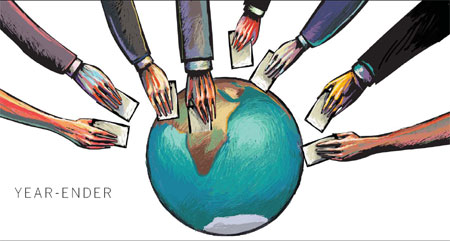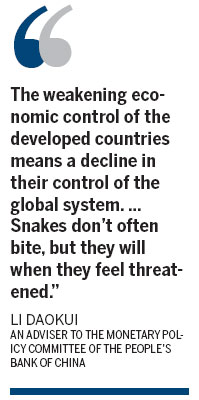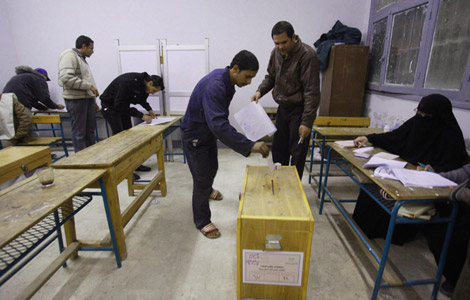Year of Dragon likely to present fiery issues
Updated: 2011-12-15 07:37
By Wu Jiao, Fu Jing and Zheng Yangpeng (China Daily)
|
|||||||||||
|
 |
Editor's Note: China Daily reporters stationed at home and abroad interview senior experts in economics, politics and international studies across the world, casting light on the top challenges the nation faces in its diplomacy and the solutions in 2012.
BEIJING / BRUSSEL - The Year of the Rabbit in 2011 has not been an easy one in China's foreign affairs, with the country experiencing its largest evacuation of citizens from a foreign country as Libya was embattled in war. It also faced more regional intensity with a high-profile strategic re-engagement of the United States in the Asia-Pacific region, which is partly the reason behind Asian neighbors stepping up maritime disputes with China. Meanwhile, the West's bleak economic situation but robust military and diplomatic posture compels China to make a gesture in response.
|
 |
Yet with continuous unrest in the Middle East that could raise oil prices as well as pose strategic challenges, the emergence of new political faces after elections in several major countries, and a luckluster world economy that might lead to negative economic and political consequences, the diplomatic atmosphere might be even more demanding for China in the Year of the Dragon.
More intensive ties
Though the US has denied its widely perceived counterbalancing of China's rising regional clout by relaunching its Asia-Pacific policy, the world is now focusing on how the two largest economies coordinate their interests in the region, which sustains world economic growth and strategic balance.
Donald Nuechterlein, a political scientist in the United States and specialist on US foreign policy, put the US Asia-Pacific strategy as follows in commentary posted on the Daily Progress website: China is probably the most important US national interest today, and the US president, as well as the secretary of state and defense secretary are "building a coalition of Asian states" to prevent China from "extending it's sphere of influence into Northeast and Southeast Asia". He said that the strategy includes US Secretary of State Hillary Rodham Clinton's well-publicized visit to Myanmar and the recent agreement with Australia to base US troops at Darwin on its north coast.
According to Peng Guang-qian, a strategist in Beijing, the biggest diplomatic test for China next year stems from the changing regional geopolitical landscape triggered by the US strategic re-engagement in the Asia-Pacific rim.
"The new US Asia-Pacific strategy is the severest challenge to the current world order, and it will totally restructure the global strategic landscape and bring unprecedented pressure on China's national security," Peng said.
China's biggest diplomatic task in 2012 is to work out how to use its economic and political strength to deal with the US containment, he said.
The United States' new Asia-Pacific policy is also partly the reason behind recent aggressive moves by some countries in the region to pressure China about maritime disputes. The claims made to parts of the South China Sea, which was not a regional issue until it was discovered to be rich in oil in 1970s, grew in the past two years, turning the region into a diplomatic hotspot.
The Lianhe Zaobao newspaper of Singapore published a commentary in October that said the "US is putting together an alliance in the region and playing ideological diplomacy to isolate China ... sowing discord between China and other regional countries to drag it into endless disputes with its neighbors".
The commentary advised China to keep in mind the nature of strategic containment by the US while trying to avoid direct confrontation.
It also urged China to make the most of its robust economic strength and enhance ties with other world players to counterbalance the US, disentangle itself from the current disputes.
Wang Yizhou, associate dean of the School of International Studies at Peking University, said China should creatively harness and maximize its resources and become more actively engaged.
Wang added that such initiative can be applied in dealing with the South China Sea issue, US re-engagement in the Asia-Pacific and the Middle East leadership reshuffle.
Economic recovery
Of the world's three largest economies, the United States struggles to boost a lagging economy and Europe has fallen into a serious sovereign debt crisis since the financial crisis that swept major economies in 2008. The White House Office of Budget and Management issued a report in October stating that next year's economic growth would be between 2.6 and 3.3 percent and unemployment at 8.3 to 9 percent, which means the US would continue to maintain a high deficit, high unemployment and low growth.
Duncan Freeman, a senior researcher at the Brussels Center for Contemporary China Studies, said that economic diplomacy will present major challenges to China in 2012.
"The continuing crisis in the EU and US will have important repercussions globally. There will be demands for China to save Europe, and also to act on frictions with the US. As the crisis in the US and EU gets more intense, these demands are likely to increase," he said.
"Economics and the fallout of the crisis will continue to be at the center of global politics, and China will be challenged to play a strong role in coming up with solutions," he said.
According to Wang Yizhou, the bleak EU and US economies will affect their domestic policies and make their diplomacies more conservative and protectionist toward China, which is not only the world's second-largest economy but also holds abundant foreign reserves.
Li Daokui, an adviser to the monetary policy committee of the People's Bank of China, the central bank, warned that the economic weakness of the European Union and US is the underlying reason behind ongoing complex changes in the global scenario.
"The weakening economic control of the developed countries means a decline in their control of the global system." Li said at a forum hosted by the Institute of Modern International Relations at Tsinghua University on global politics in Beijing on Dec 4.
"Snakes don't often bite, but they will when they feel threatened," Li said.
Global hotspot issue
The highly vulnerable world political and economic situation in 2012, coupled with elections in some major countries, will keep regional and global hotspot issues active next year. The regional hotspots might affect Chinese strategic interests, for the country now has a wide presence and political and economic interests across the world.
The year 2012 might see the continuation of violent uprisings and armed conflicts in the Middle East and Northern Africa, where political turmoil provoked an international war and domestic violence, as in Libya, Tunisia, Egypt and Syria in 2011. Meanwhile, the longstanding conflicts involving the Korean Peninsula and the Persian Gulf might also explode if negotiations get derailed.
China has to be fully prepared for possible "spill-out" effects, for example if continued Middle East unrest pushes up oil prices and poses strategic challenges, said Wang Yizhou.
Mark Frazier, who led nationwide China Town Hall meetings at the University of Oklahoma, said two of the major diplomatic challenges China faces in 2012 will be the ratcheting up of Western pressure on Iran and the likely escalation of violence and potential for armed conflict in Syria.
Finally, as observed by Dennis Pamlin, director of the United Nations Low-Carbon Inniative, 2012 will bring increased pressure on China to take the lead in many areas.
Pamlin said, "The call for leadership is a way for other countries to divert focus from their own responsibility".
Yet Men Jing, a professor of EU-China relations at the College of Europe in Belgium, said a problem for China will be balancing domestic development with its external responsibilities.
"As a rising power, China faces growing pressure from other countries to take increasing international responsibility. How much responsibility China should take and in which field China should take more responsibility are matters that Beijing must give great attention to," Men said.
According to Yan Xuetong, dean of the Institute of Modern International Relations at Tsinghua University, China, as a world power, should not adopt neutrality or fail to set a policy.
"China will not oppose some countries taking the leadership in sectors they are strong in, but at the same time, China should also shoulder more global responsibility in sectors that it is advanced in", Yan said.
Chen Weihua in New York and Zhang Yunbi in Beijing contributed to this story.
Hot Topics
HIV/AIDS, Egypt protest, Thanksgiving, climate change, global economic recovery, home prices, high-speed railways, school bus safety, Libya situation, Weekly photos
Editor's Picks

|

|

|

|

|

|







